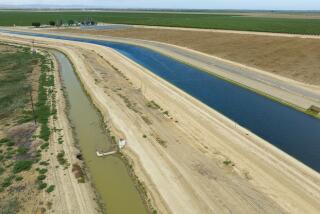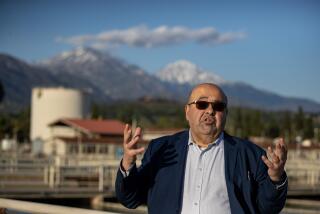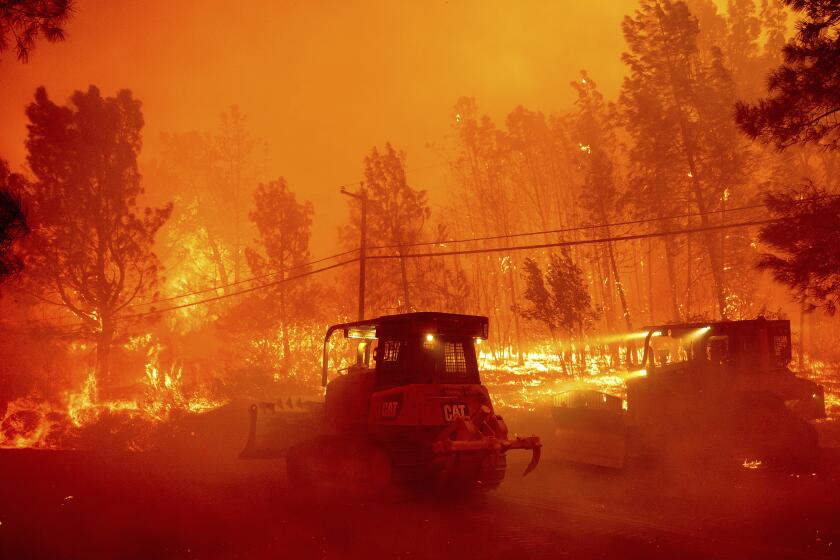Trump’s pick for a top Interior post has sued the agency on behalf of powerful California water interests
When President Trump nominated David Bernhardt for the No. 2 spot at the Interior Department, the administration cited his extensive expertise.
What the announcement failed to mention was that much of that experience was lobbying and doing legal work to elude or undermine Interior Department policies and protections.
As a partner in one of the nation’s top-grossing lobbying law firms, Bernhardt has represented major players in oil, mining and western water — all areas that fall under the purview of Interior agencies that Bernhardt would oversee if confirmed as the department’s deputy secretary.
Bernhardt’s firm, Brownstein Hyatt Farber Schreck, has sued Interior four times on behalf of Westlands Water District, the nation’s largest irrigation district. Bernhardt personally argued one appeals case challenging endangered species protections for imperiled California salmon.
Here are a few of the potential conflicts a key Interior Department nominee may face »
Since 2010, Brownstein Hyatt has collected $2.75 million in lobbying fees from Cadiz Inc., a private company that wants to build a water pipeline on a railroad right-of-way that crosses federal land managed by an Interior agency. Bernhardt has done legal work for Cadiz and one of his colleagues is the chief executive of Cadiz, which has paid the law firm partly with stock shares.
The web of potential conflicts of interest is likely to be a major focus of Bernhardt’s confirmation hearing Thursday before the Senate Committee on Energy and Natural Resources.
The committee’s top Democrat, Sen. Maria Cantwell of Washington, last week sent Bernhardt a letter asking for more details on his work for clients who probably will have continued dealings with Interior agencies.
Trump’s ethics order bars executive branch appointees for two years from getting involved in matters on which they lobbied.
In a May 1 letter to Interior’s ethics officer, Bernhardt wrote that if confirmed, he will “withdraw” from his law partnership. He said he would recuse himself from client-related matters for one year — “unless I am first authorized to participate” in them.
Environmentalists argue that Bernhardt would have to remove himself from so many important issues facing Interior that he would be unable to do his job — or, in the alternative, will receive administration waivers to deal with them despite his history of representing department adversaries.
“The idea that Mr. Bernhardt would recuse himself from a long list of all the major issues that Interior faces in California is just not credible,” said Barry Nelson, policy representative of the Golden Gate Salmon Assn., which has fought Westlands over fish protections.
Bernhardt’s nomination in some ways echoes other Trump picks.
Scott Pruitt, head of the Environmental Protection Agency, sued the EPA multiple times while he was Oklahoma’s attorney general. Energy Secretary Rick Perry once vowed to abolish the department he now heads.
If the full Senate approves Bernhardt’s nomination, it will mark the second time he has moved through Washington’s revolving doors.
Bernhardt went to work as a Brownstein Hyatt associate in 1998 and left the firm in 2001 for a series of posts at Interior under President George W. Bush. He rose to the position of Interior solicitor, the department’s top lawyer, and rejoined Brownstein Hyatt after Obama was elected.
The firm’s website, along with ethics filings required of nominees, shows that Bernhardt and Brownstein Hyatt have performed legal services or lobbied for clients that have dealings with virtually every branch of Interior.
Among those clients are:
- Cobalt International Energy, which holds major oil and gas leases in the Gulf of Mexico
- Rosemont Copper Co., which wants to develop a large open-pit copper mine in Arizona
- The Navajo Nation, which has been involved in water rights settlements
- The Independent Petroleum Assn. of America, which represents oil and gas producers.
Until his recent resignation, Bernhardt also served on the board of the Center for Environmental Science Accuracy and Reliability, a California organization that has challenged listings under the Endangered Species Act.
In a May 8 letter to the Senate energy committee, Interior ethics official Melinda Loftin said that after reviewing Bernhardt’s financial disclosure report and his ethics agreement, she was satisfied that he would comply with the department’s conflict-of-interest rules.
Democrats disagree.
“Bernhardt‘s [client] representation covers a range of special interests that are constantly doing business with the Department of Interior seeking approvals and engaged in regulatory relationships with the department,” said Rep. Jared Huffman (D-San Rafael). “It would be hard to find anyone in the United States that is more conflicted and disqualified for this job than Mr. Bernhardt.”
In her letter, Cantwell asked Bernhardt if he played any role in a recent decision that eased the way for Cadiz’s potentially lucrative groundwater project.
In late March, an acting assistant director of the U.S. Bureau of Land Management revoked two legal guidances that underpinned the agency’s 2015 decision that Cadiz could not use an existing federal railroad right-of-way for a new water pipeline.
That decision threw a huge roadblock in the company’s plans to pump groundwater from beneath its desert holdings and sell the supplies to Southern California communities.
Cantwell asked Bernhardt if he served on Trump’s Interior transition team and whether he discussed the Cadiz project with the team, the Trump administration or Interior staff. She also wondered whether Bernhardt’s payout when he leaves the law firm would reflect any compensation from Cadiz.
According to Cadiz filings with the Securities and Exchange Commission, the company has issued 200,000 shares of common stock to the Brownstein firm and could award another 200,000 shares if the project is built.
Bernhardt was registered as a Westlands lobbyist from 2011 through late 2016, during which time Westlands paid his firm nearly $1.4 million in fees.
Bernhardt lobbied Congress and Interior on the terms of a settlement of a long-standing legal fight over toxic irrigation drainage in the Westlands district. The agreement — approved by the Obama administration and now pending before Congress — turned out to be far more favorable to Westlands than originally proposed by Interior.
“Bernhardt’s extensive experience serving under Secretary [Gale] Norton and his legal career is exactly what is needed to help streamline government and make the Interior and our public lands work for the American economy,” Interior Secretary Ryan Zinke said in a statement.
Twitter: @boxall
ALSO
Charter backers poised to win their first L.A. school board majority
Judge throws out lawsuit challenging California’s execution law
200 protesters spell out ‘RESIST!’ in flash mob at Trump’s Rancho Palos Verdes golf course
Previously deported hit-and-run suspect criminally charged with federal immigration violation
More to Read
Sign up for Essential California
The most important California stories and recommendations in your inbox every morning.
You may occasionally receive promotional content from the Los Angeles Times.







